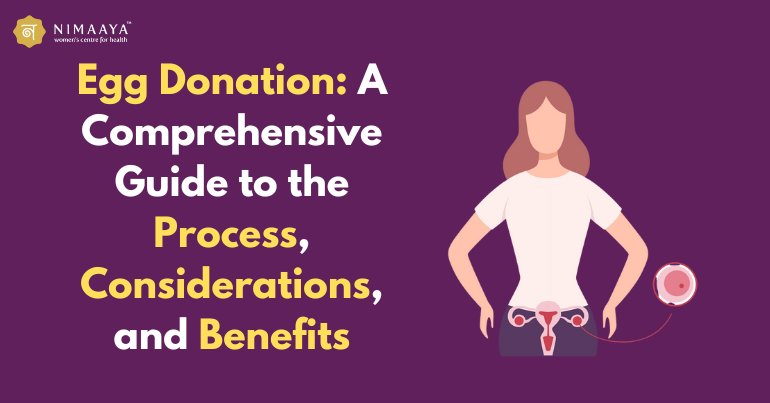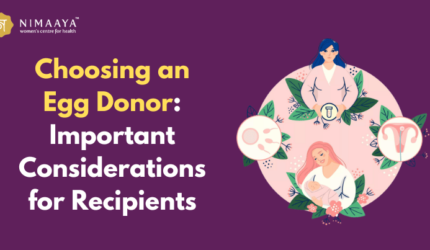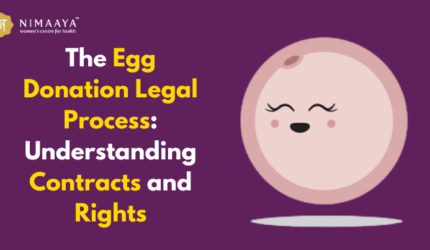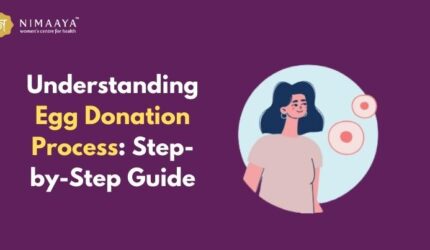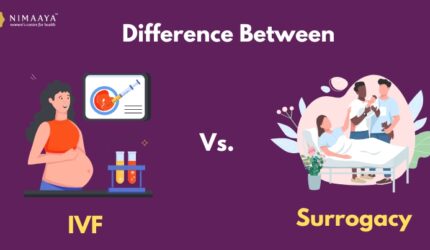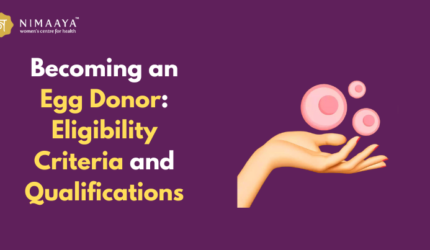Did you know what the legal age for egg donors is?
The age must be between 21 and 35 years, and it’s preferred that the woman has already had at least one child.
Egg donation in India had been legal for many years, falling under the ART regulation bill of 2020. Therefore, before considering egg donation, it’s essential to make sure that you are thorough with all prevailing rules and regulations.
In this blog, we will explore the concept of egg donation, the egg donation process, the benefits of egg donation, the success rates associated with it, and much more.
At Nimaaya, you’ll have the expertise of IVF specialists Dr. Pooja Nadkarni Singh, and Dr. Yuvrajsingh Jadeja. You will be guided throughout the process that needs to be followed to accomplish it without any risk involved.
What is Egg Donation?
In layman’s terms, egg donation is an assisted reproduction method where one woman donates her egg to help another woman conceive a baby. After that, these donated eggs can be fertilized with either the male partner’s sperm or the donor’s sperm. This process is particularly beneficial for women who cannot use their eggs due to conditions like ovarian failure, the risk of congenital anomalies in the fetus, or advanced age.
The egg donation process typically involves: –
- Retrieving one or more eggs from the donor
- Fertilizing these eggs in a laboratory setting
- Transferring resulting embryos into the recipient’s uterus.
Egg donation is commonly used in the IVF process and other fertility treatments. At Nimaaya, the emotional journey of egg donation every year involves the successful transfer of eggs, leading to improved pregnancy rates and the fulfillment of many women’s dreams of conceiving a baby.
Egg Donation Process
Initial Screening
At Nimaaya, the egg donation process begins with a review of the medical history, family factors, and lifestyle considerations. Moreover, it’s important to note that donors are between 21 to 30 years of age.
Detailed Medical Evaluation
The potential donor undergoes an extensive medical evaluation, which includes blood tests, ultrasound, and hormonal assessments. This evaluation helps us determine the donor’s ovarian reserve and overall health.
Genetic testing is conducted to identify potential genetic conditions or chromosomal abnormalities.
Legal and Consent Process
Before proceeding, the egg donor enters a legal agreement outlining responsibilities and rights. Usually, it covers issues such as compensation, parental rights, and confidentiality.
Hormone Therapy for Ovarian Stimulation
This step involves stimulating the ovaries to produce multiple mature eggs within a single menstrual cycle., increasing the successful pregnancy.
The next step is to know there are two types of hormones:
FSH (follicle-stimulating hormone)
It is injected to stimulate the growth and development of multiple follicles, each containing an egg.
LH (Luteinizing hormone)
It helps trigger ovulation, with FSH being the primary hormone used for ovarian stimulation. These hormones are then administered either through the skin or into the muscles.
Monitoring
The donor’s progress is closely monitored throughout the hormonal treatment through regular ultrasound and blood tests. These assessment tests help you assess the number and size of developing follicles, allowing for adjustments to hormone dosage accordingly.
Egg Retrieval
When the developing follicle is appropriate, an HCG trigger shot is given to induce the egg’s final maturation. Then, the egg retrieval procedure is scheduled within 36 hours of the trigger shot.
Hormonal Treatment Injection for Egg Donation Process
The hormonal treatment injection plays a crucial role in egg donation, encouraging the growth and maturation of multiple eggs within the donor’s ovaries. This step is essential because many mature eggs can increase the chances of success in the IVF procedure. Let’s explore this in detail:
Estrogen level
They are closely monitored to track the ovarian response. Estrogen is a hormone produced by the ovaries. Monitoring these levels helps assess the donor’s ovarian response and ensures the stimulation progresses as planned. The appropriate estrogen level indicates the follicles are developing properly.
Follicles size
Follicles are small, fluid-filled structures in the ovaries where eggs develop; monitoring their size is essential. It indicates the maturity of eggs within the follicles. What makes the follicles important is information about their maturity. They are more likely to contain mature eggs for retrieval as they grow. The goal is to reach the desired size in multiple follicles before proceeding to egg retrieval.
Follicular puncture
The procedure is used to collect mature eggs from the donor’s ovaries. It involves inserting a thin needle through the vaginal wall into the ovaries to suction out the mature eggs from the follicles. The timing of egg retrieval is critical, and it occurs when the majority of the hair has reached the desired size, a determination made through ultrasound monitoring.
Also Read: Hormonal Imbalances and Female Fertility: Restoring Balance
Consideration During Egg Donation
Anonymous or non-anonymous egg donor
Choosing an anonymous egg donor is generally preferred as it allows for more information about their identity, genetics, previous health history, and personal background.
In the case of anonymous egg donors, it ensures high confidentiality and privacy for the donor and recipient.
On the other hand, selecting an anonymous donor means that you can access the doctor’s background, medical history, education, and identity of the donor and build a connection.
Fresh or frozen eggs
Fresh eggs are commonly used in egg donation procedures because they facilitate immediate fertilization and embryo transfer without delays. This cost-effective approach synchronizes the menstrual cycle of the donor and the recipient.
On the other hand, frozen eggs provide flexibility in timing, as they can be stored and used later, allowing for better coordination of cycles.
Also Read: Fresh vs. Frozen Embryo Transfer: Comparing Two IVF Transfer Methods
Medical and mental health
The most important point to be kept in mind is the medical condition of the chosen egg donor, as it directly impacts the health condition of your baby.
At Nimaaya IVF Center, we undergo a rigorous medical checkup of each donor to ensure they pass every test for a successful egg donation. This evaluation includes blood tests, medical tests to detect infectious diseases, and genetic, psychological, and physiological testing. Additionally, it’s crucial to consider the blood type compatibility between the egg donor and intended parents.
These considerations are paramount in ensuring the donor and recipient’s safety, success, and overall well-being in the egg donation process.
First-time or repeat donor
When considering first-time donors, it’s important to note that only fresh eggs with potentially high quality and fertility are typically used. On the other hand, the drawback is that there is no previous history of successful egg donation cycles, making predicting the chances of successful pregnancy challenging.
In the case of repeat donors, there is an advantage in that you can track the history of successful donation cycles. This includes details such as the donor’s previous processes, medical history, the number and quality of eggs retrieved, and the resulting pregnancies. However, repeat donors may have limited eggs available if they have completed multiple cycles in the past.
Lifestyle and personal background check
When selecting an egg donor for an IVF procedure, it is essential to take into account various factors such as the donor’s lifestyle and personal background. These considerations play a significant role in ensuring a suitable match for both the recipient and the donor. There are a few factors to be kept in mind:
Genetic history
Understanding the donor’s family medical history is essential to identify potential congenital or hereditary conditions that may be passed on to the child.
Cultural background
Some recipients prefer donors with similar cultural backgrounds to ensure their future children can inherit characteristics that align with their family identity.
Health condition
The health condition means the overall health and well-being of an individual. It means physical fitness, nutrition, and lifestyle choices would be considered by the donor. At Nimaaya, even before the recipient considers all these factors, we make sure to consider them all, pass all egg donation legal procedures, keep transparency, and give it a green flag as we like to build the trust that has been there for more than decades among our customers.
Features of body
The most crucial factor while considering egg donation is the donor’s features to pass on to the future child. The features include hair, eye color, height, and another ethnicity to be considered.
Parents often consult doctors and ask them to consider the body’s features before beginning the egg donation procedure.
Benefits of Egg Donation
Experiencing parenthood
The benefit of egg donation is that individuals and couples experience parenthood, even when facing infertility issues, genetic conditions, or advanced maternal age.
Genetic diversity
Genetic diversity allows couples to introduce genetic diversity into their family. They can select a donor based on desired characteristics for their future kid.
Higher success rate
Egg donation often results in a higher success rate when compared to other assisted reproductive techniques, especially for women dealing with fertility issues.
Reduced risk of genetic conditions
The parents are usually tension-free, as the risk of passing on certain health conditions, such as cancer, diabetes, or any other, to their future child is significantly reduced.
Risk During Egg Donation
The risks associated with egg donation are relatively low, and women may experience similar discomfort and risk as other fertility treatments. Here are a few problems, such as experiencing bleeding damage to the bowel or bladder. On the other hand, other symptoms could be:
- Rapid weight gain
- Stomach pain
- Vomiting
- Difficulty in breathing
Bottom line
To summarize, egg donation is a fertility treatment option for parents facing infertility issues, health problems, genetic disorders, etc.
At Nimaaya, we have a dedicated team of IVF specialists that ensures couples receive proper counseling, treatment, and guidance at every step, irrespective of the infertility method they choose for conceiving a baby.
Also, we are excited to introduce our checkout, our new IVF fertility center in Ahmedabad, recently inaugurated and equipped with state-of-the-art facilities. It aims to be one of the most promising IVF centers with up-to-date facilities that prioritize the comfort and health of patients and their families. Our stay facilities are meticulously maintained and adhere to strict hygiene standards.

